#huac witch hunt
Explore tagged Tumblr posts
Text
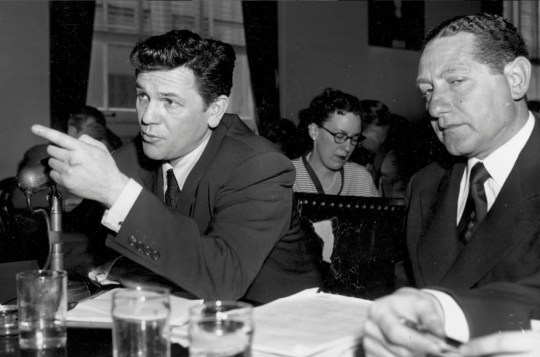
A Golden Boy…a TRUE American Hero.
Adam McKay’s DEATH ON THE LOT podcast, episode 3 features John Garfield unjust framing by HUAC.
The guests on the podcast are ALL the people I would have selected to interview: daughter, actor and artist, Julie Garfield; authors, Robert Nott and Isaac Butler, and also a surprise—actor, Lee Grant one of the few remaining to be blacklisted in Hollywood in the 50’s. Excellent commentary by all. Good on you, Adam McKay and team!

The Red-Baiting of a Golden Boy | Episode 3 | A new generation of actors questioned the status quo; a rattled establishment fought back; dire consequences ensued. We’re talking John Garfield, Hollywood’s first method actor. LISTEN
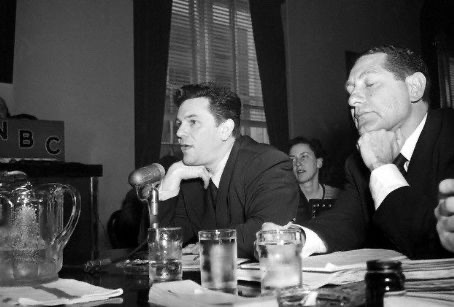
"When I was originally requested to appear before the committee, I said that I would answer all questions, fully and without any reservations, and that is what I have done. I have nothing to be ashamed of and nothing to hide. My life is an open book. I was glad to appear before you and talk with you. I am no Red. I am no pink. I am no fellow traveler. I am a Democrat by politics, a liberal by inclination, and a loyal citizen of this country by every act of my life.”
—John Garfield’s statement before House Un-American Activites Committee (HUAC) on April 23, 1951.
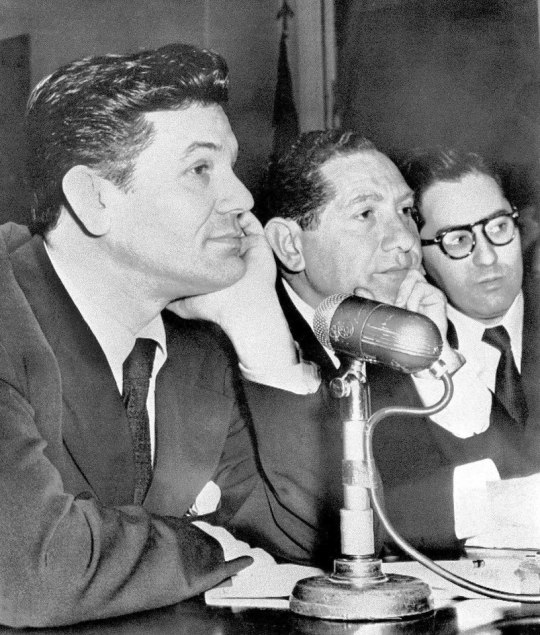
All Julie wanted to do was what he did best: ACT. They took everything away from him. Despite that, he held his street cred. He gave away not a single name during his testimony. No ratting on friends and associates from Julie. Badass.
The others involved: Shameful. Shocking that Julie’s life and livelihood could be toyed with so heartlessly and carelessly. This was a man who did so much for his country. How could the ruthless, power hungry politicians ignore these examples of John Garfield’s patriotism?

During WWII, he cofounded—after bringing the suggestion to Bette Davis—the Hollywood Canteen. The Canteen operated from October 3, 1942 through November 22, 1945 (Thanksgiving Day), as a club offering free of charge: food, dancing and entertainment for service personnel usually on their way overseas. Nearly four million people were served as they were serving us!
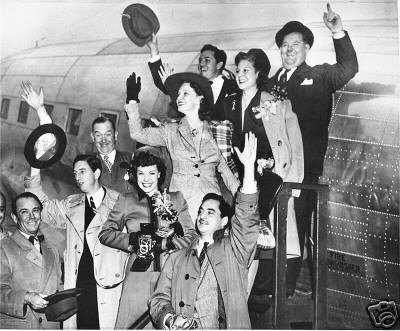
The Hollywood Victory Caravan included Eddie Dowling, President of Camp Shows, Ray Bolger, Mitzi Mayfair, Louis Polanski, Stan Laurel, Oliver Hardy, Jane Pickens, Benay Venuta, and John Garfield serving as master of ceremonies. One of the first USO tours, Flying Showboat revue toured U.S. military bases in the Caribbean. These celebrities performed under some extremely trying conditions, as the weather was brutally hot and many of the camps were not equipped to host theatrical performances. The show must go on (!) and it did.
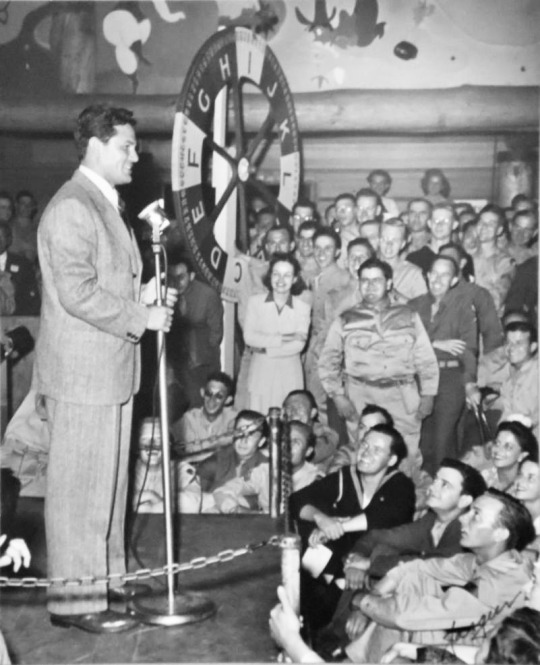
Julie running an event at the Canteen.
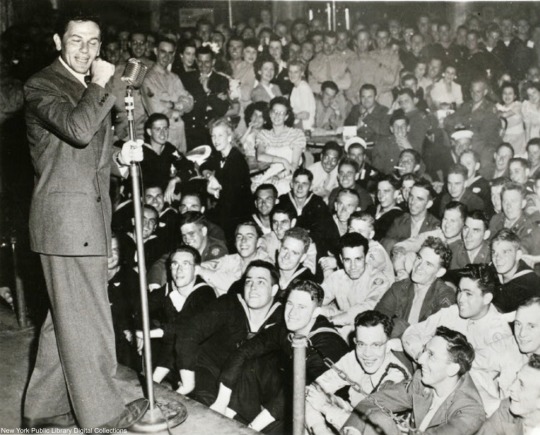
Julie entertains the troops! Audience members at the Canteen filled the hall.
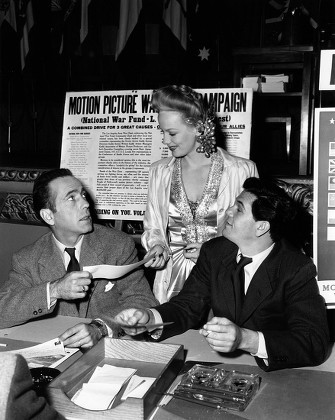
Here he is selling War Bonds to support WWII efforts with Humphrey Bogart in 1943. Not sure who is pictured with them.

Julie championed the story of real life marine hero, Al Schmid bringing it to the screen in PRIDE OF THE MARINES. He read about the hero in LIFE magazine and brought the idea for a film to the studio. He stayed with Sargent Schmid and his wife for a couple weeks to portray the man respectfully and honesty.
#john garfield#death on the lot#adam mckay#huac witch hunt#house un-American activities committee#Julie Garfield#Robert nott#Isaac butler#Lee grant#hollywood canteen#bette davis#al schmid#pride of the marines#humphrey bogart#Flying Showboat#hollywood victory caravan#uso tours#wwii
17 notes
·
View notes
Text

From the shoulders of cheering, singing supporters, Dalton Trumbo and John Howard Lawson make farewell speeches as they prepare to leave Penn Station for Washington, where they were to start serving one-year prison terms for contempt of Congress, June 9, 1950. The "Hollywood 10" had appeared before the House Un-American Affairs Committee in October, 1947, and refused to answer questions regarding their possible affiliations with the Communist Party. After they were released, they were blacklisted by the Hollywood studios.
Photo: Marty Lederhandler for the AP
#vintage New York#1950s#Marty Lederhandler#Hollywood 10#McCarthyism#Dalton Trumbo#John Howard Lawson#red baiting#HUAC#June 9#9 June#witch hunt
54 notes
·
View notes
Photo

Infamy: On this day in 1938, the House Committee on Un-American Activities was established to investigate suspected communist sympathies among private citizens and organizations, leading to the blacklisting of hundreds of artists and academics. The committee became permanent in 1948 and was terminated in 1975. The HUAC is notable for causing de facto media censorship among artists suspected of having communist sympathies. Their investigations resulted in a Hollywood blacklist of over 300 actors, directors, and others. Artists whose careers were damaged by the committee included Charlie Chaplin, Orson Welles, Alan Lomax, Paul Robeson, Aaron Copland, and Yip Harburg. When one Senator asked Robeson why he didn't remain in the Soviet Union, he replied "Because my father was a slave and my people died to build this country, and I am going to stay here and have a part of it just like you. And no Fascist-minded people will drive me from it. Is that clear?" In 1960, William Mandel, an expert on Soviet affairs who had lost his position as a fellow at Stanford University's Hoover Institution due to anti-communist repression, was called to testify in front of the HUAC. When asked "Are you now or have you ever been a member of the Communist Party?", Mandel responded: "Honorable beaters of children, sadists, uniformed and in plain clothes, distinguished Dixiecrat wearing the clothing of a gentleman, eminent Republican who opposes an accommodation with the one country with which we must live at peace in order for us and all our children to survive... If you think that I am going to cooperate with this collection of Judases, of men who sit there in violation of the United States Constitution, if you think I will cooperate with you in any way, you are insane!" Read more: https://en.wikipedia.org/.../House_Un-American_Activities... https://www.mtsu.edu/.../house-un-american-activities...
[h//t Guillaume Gris]
#HUAC#Communism#Guillaume Gris#1930s and 40s#1950s#oppression#witch hunt#history#House Committee on Un-American Activities
10 notes
·
View notes
Text
...Have people forgotten about the Communist Witch hunts in the 1950s? McCarthyism? Second Red Scare? Cold War and accusing everyone of being a Russian spy? Is this really an argument the right uses? That no one got cancelled in the 1950s? because... what?
People weren't just getting ~cancelled~, people were getting blacklisted, thrown in prison, and their lives were completely demolished for decades after.
The Civil Rights Movements in America were pushing ahead, and people were fighting back the inequalities-- Linda Brown, Thurgood Marshall, The Highlander Folk School, Brown Vs Board of Education, Rosa Parks, Emmett Till, Montgomery Bus Boycott and the white people who bombed Black churches and homes, Autherine Lucy, The Montgomery Bus Boycott, Civil Rights Act of 1957--- people were getting thrown in prison, their lives destroyed, or MURDERED.
People were not just getting ~cancelled~ in the 1950s. They were getting imprisoned and murdered.
THIS IS WHY HISTORY CLASS IS IMPORTANT, PEOPLE
Also... I don't really believe in ~cancel culture~ anyway.
Am I supposed to feel bad because Roman Polanski is having a hard time getting work?
A few years after Mel Gibson was ~cancelled,~ he was getting a ten minute standing ovation, winning 30 out of 85 nominations, including several Oscar nominations. He's had steady work for all these years, only taking off a couple of years here and there-- and he's doing quite well, now.
JK Terf Rowling ~cancelled~, a billionaire, continues to sell out HP merchandise like there's no tomorrow, cheerfully and intentionally and very publicly just flouted a new anti-hate crime law with absolutely no consequence to her, and has a HP tv show coming out. She's fine. She and her billions don't care that we are furious at her for repeatedly attacking and harassing trans women.
Kevin Spacey is fine-- making millions doing movies. Brad Pitt, fine. Bill Cosby and Roseanne and Louis CK are all touring again. They're all just FINE. Kevin Hart, Ellen, Mark Wahlberg, Arnie Hammer, Johnny Depp, Brad Pitt, Woody Allen. They are all FINE.
Dave Chappelle made millions off his TERF rants on Netflix. Most of the men who were named for #metoo have completely recovered.
They're all FINE.
It's not cancel culture. It's consequence. And even then, most famous people are immune. Their "cancellation" only really lasts a couple of years, so they live with their millions, take walks, have coffees, travel-- and then a few years later, their much richer and influential friends send them work or get them some positive article, and within another year or so, everything is erased.
They're mad because we want consequence to their actions.
They call it ~cAnCeL CuLTurE~ because we're finally asking for some kind of consequence when the commit a crime, harass or abuse people, or are just, in general, awful people.
Accountability ≠ Cancel Culture.
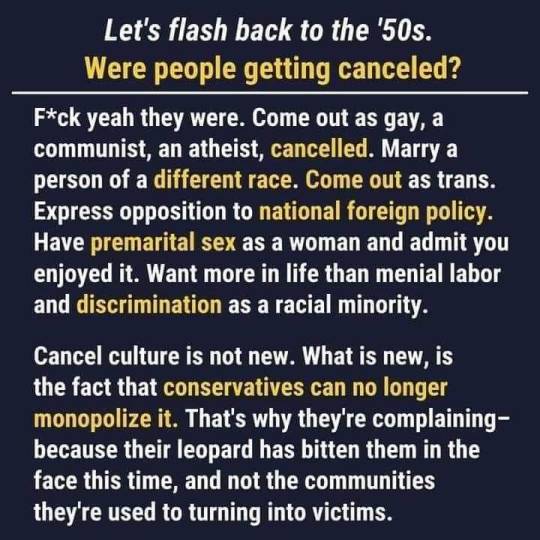
#communist witch hunts#mccarthyism#second red scare#joseph mccarthy#j edgar hoover#HUAC#the hollywood 10#hollywood ten#cold war#red scare#civil rights movement#linda brown#thurgood marshall#the highlander folk school#brown vs board of education#Rosa Parks#Emmett Till#Autherine Lucy#The Montgomery Bus Boycott#Civil Rights Act of 1957#cancel culture is bullshit#we just want accountability#i don't feel bad for#roman polanski#jk rowling#mel gibson#kevin spacey#kevin hart#bill cosby#brad pitt
8K notes
·
View notes
Text
Rewatching Trumbo for the first time in years.
I did not remember how amazing John Goodman was in this movie. I forgot that he completely stole the film from under Bryan Cranston's feet.
'it doesn't matter! I make garbage!!! Wanna call me a pinko in the papers? Do it! None of the people that go to my fuckin' movies can read!!!'
#john goodman#trumbo#I make garbage!!#bryan cranston#excellent film#films about hollywood#communist hearings in hollywood#communist hearings HUAC#communist hearings#1940s-1960s Hollywood#period films#hollywood 1940s-1960s#communist witch hunts
0 notes
Note
"Both indigenous and colonizers" CAN PEOPLE STOP TALKING ABOUT SHIT THEY DON'T UNDERSTAND PLEASE
This wave of antisemitism and bullshit about "indigenous vs colonizer" makes me so scared as an indigenous person in the US of what will happen when Land Back movements do result in actual sovereignty restoration and then tribes do what people do and disagree over land and resources, like we were doing for thousands of years before Europeans arrived. Will we be reduced down to colonizers too??
It feels like Westerners, especially USAmericans, have such a black and white idea of what it means to be indigenous and what it means to be a colonizer/settler (because those terms are always conflated) and it makes me so angry and frustrated to see people apply those standards and lines thinking not just to complex sovereignty movements in their own countries but also to incredibly complex conflicts and wars happening on the other side of the world.
The damage I've seen done to sovereignty movements here in the US alone, people going around claiming that we want all "settlers" to go back to Europe or that we're going to start massacring people, has been horrible and the fact that it's all just to justify antisemitism makes me sick.
Genuinely. They're blocked now, but that same person said something to the effect of "Would an Iranian praying in a Mosque built on the ashes of a former synagogue be decolonization?"
And that was the point at which I was like. Ok. It seems like most people genuinely don't actually know what the terms "colonization", "colonizer" and "coloniality" mean. Obviously, that wouldn't be decolonization, because the Jews never colonized Iran. Emigration and colonization aren't the same fucking thing!
I used to have so much faith in my generation. I thought we were critical thinkers, capable of flexibility and engagement with new ideas. But I'm realizing now that we're basically just rebranded boomers. Back in the day, anybody you disagreed with was labelled as a "Communist". It didn't actually fucking matter if they were communist sympathizers, Soviet sympathizers, or even if they were remotely allied with socialist ideals. You could just call them a "Communist" and be done with it, without even understanding what that term means.
It's the same shit today. Instead of a HUAC witch hunt targeting communists, it's a social witch hunt targeting "colonizers" and "Zionists". I am terrified that the moment indigenous rights movements in the Americas and Oceania start making practical strides in Land Back, regaining rightful control over the ways your own land is used, you'll all be labelled as "colonizers" or "imperialists" or whatever the bad buzz word of the month turns out to be.
People simply can't wrap their heads around the idea that indigenous decolonization doesn't have the end goal of ethnically cleansing non-native people from the Americas. And it's because they're so absorbed in colonial thinking. They can't even fucking imagine what sovereignty could look like beyond an authoritarian structure based on control and violence. It's the same with Israel and Palestine-- they think that Jewish sovereignty must look like complete Jewish control to the detriment of Arabs, and they think Palestinian sovereignty must look like total Arab control to the detriment of Jews. The idea that a shared state or a two-state solution is "racist" stems from that false dichotomy.
Establishing an ideological binary of violence that pits "indigenous" against "colonizer", "native" against "settler", and "us" against "them" with no room for cooperation or collaboration is the core of colonialism. Because the core of colonialism is the idea that only one group can have true power at a time. And that's just not the way the world has to work.
273 notes
·
View notes
Note
We all know about how the HUAC trial of the 50s was, accentually, the end of the mystery men but something that is rarely talked about is the massacre of the 70s. where doctor Trapp killed over 35 superheroes and supervillains over 2 years, witch the most famous victims being the justice experience.
Care to talk about all of those fallen heroes?
Yes, well I must admit to my professional biases first. I know that one of my bad habits, the bad habits of my entire academic focus is that it makes it seem that there were no superheroes between the retirement of the JSA and the foundation of the JLA. It's obviously not true. If you're not from the United States you'd have good cause to be offended by the implication. But there's a reason. The first reason is that because my focus is on the Golden Age it's easier for me to present historical narratives from that angle to the layman, no offense. The second...is because of what happened to that forgotten middle generation.
The tragedy of the Justice Experience.
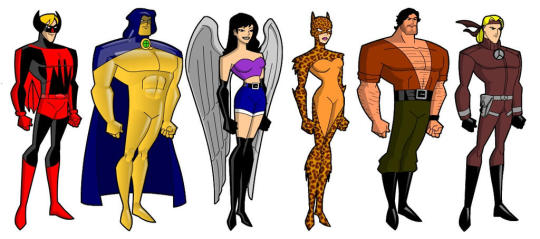
(Image of the Justice Experience created by famous cartoonist Bruce Timm. (OOC: Gwhitmore on DA). Perhaps for a never made cartoon along the lines of his famous MAU franchise)
They appeared in the early 70s, from the left to right: Acro-Bat, Bronze Wraith, Songbird, The Manx, Mr. Action and Major Flashback. They were a very low key organization but not by choice.
The media, and especially the police and the government were still deeply anti-vigilante by nature. The records of the Experience are heavily incomplete because anything they did was poorly reported and any criminals they caught were often fully credited to the police or the FBI no matter how much sense that made or how much everyone knew it was bullshit.
And that institutional disinterest probably killed them.
A villain by the name of Dr. Trap made it his personal mission to hunt down the heroes and villains of this era, as well as their friends and family. Due to legal pressure the heroes of this era had been unable to organize in the vein of the heroes of previous and following periods and the law enforcement of the time refused to take the threat of a supervillain seriously. Treating Dr. Trap as LESS dangerous than a normal killer due to his "eccentricities"
Nearly two dozen villains of the era were killed inside their own jail cells when prison staff refused to upgrade security or even increase nightly patrols.
The only survivor of the Experience was the Bronze Wraith who would later be revealed as an alternative alias of J'onn J'onzz, the Martian Manhunter. The raid that eventually captured Trap was the only case between their dis-and-reappearance that prompted the public return of the Justice Society who were able to track down and capture Trap within HOURS using their wider organizational net and remaining government contacts, further placing a spotlight on the culpability of authorities in the massacre.
35 people lost their lives in less than 2 years, the powers that be have still yet to acknowledge the role of police disinterest in exacerbating the crime and allowing Trap free reign despite standing condemnations from both the Justice Society and the Justice League. To this day the Martian Manhunter holds a private vigil alongside those the Experience left behind, taking place not on the anniversary of their deaths but of their foundation, to further bring light to their deeds.
The Manhunter has very rarely spoken on his time with the Experience in public saying "their memories are a private matter". His is also quoted as saying "I made a vow to myself that no longer would I allow my allies to suffer in silence. I unveiled my alien visage to the world, I encouraged my teammates to operate openly and without fear. And forever more I have deeply mistrusted those who hold power in human governance."
Justice Experience Remembrance Day is July 6th.
#dc#dcu#dc comics#dc universe#superhero#comics#tw unreality#unreality#unreality blog#ask game#ask blog#asks open#please interact#worldbuilding#justice experience#dr trap#doctor trap#martian manhunter#john jones#jonn jonzz
34 notes
·
View notes
Text
#1060 How did McCarthyism reach such a level?


How did McCarthyism reach such a level? There was a genuine fear of communism in America that McCarthy used to accelerate his rise to power. McCarthyism is named after Joseph McCarthy, who was a senator from Wisconsin until his death in 1957. McCarthyism started in 1947 and it ended in 1959, two years after McCarthy died. Joseph McCarthy didn’t jump on the bandwagon until 1950, so the era known as McCarthyism didn’t actually have McCarthy’s involvement until 1950. What was McCarthyism? It was a communist witch hunt in which Senator Joseph McCarthy had carte blanche to summon government officials, academics, actors, and many other people in public positions, before the House Committee on Un-American Activities (HUAC). McCarthy ended up in charge of the Senate Permanent Subcommittee on Investigations and he was responsible for investigating suspected communists. At these hearings, there was often no evidence more than accusations and the accused people were not allowed attorneys or to be able to cross-examine the accuser. They had an impossible task in defending themselves and many were found guilty of being communist. Blacklists sprang up, the Hollywood blacklist is probably the most famous, and people on the list could not find work in that industry. McCarthyism started before McCarthy, when President Truman issued a law in 1947 that demanded federal employees were checked for “loyalty” and that they would be dismissed if they were found to be disloyal to the United States government. The law didn’t mention communism. This seems strange, but the global situation in 1947 seemed very unstable. The latter part of World War 2 had seen the USSR rise as a global superpower. The USSR had taken over most of eastern Europe and was becoming a huge country with enormous resources. They were working on a nuclear bomb, that they would successfully test in 1949. A war in Korea was looking more likely and it appeared that the USA and the USSR would be on opposite sides of it. There was great fear of the USSR in America and that was felt more generally as a fear of communism. In 1950, Joseph McCarthy gave a speech in Wheeling, West Virginia. He was talking to the Republican Women’s Club and, amongst other things, he talked about the “Enemies Within”. He held up a piece of paper that he said had the names of 205 communists currently working in the US State Department. A speech like that would probably have disappeared, but, because of the fear of communism, it was picked up by the press and became huge. McCarthy, being a politician, realized he was onto a good thing and doubled down on his claims. A month later, the Washington Post came up with the name McCarthyism, but they meant it as a derogatory term. McCarthy didn’t see it that way and he embraced it. McCarthy had no actual proof against the people he accused, so he widened his list of targets to include homosexuals. He said that they were at risk of blackmail because they would want to keep their sexual orientation a secret. He was disliked amongst other senators, but his “war” on communism and homosexuals appealed to the public. After a couple of years, it reached the point where people didn’t want to confront him in case they ended up being accused. In 1952, Eisenhower became president. He was a strong person, but he didn’t appear to want to confront McCarthy either. Probably, McCarthy had too much public opinion behind him and Eisenhower, as a new president, didn’t feel he had the confidence to go up against McCarthy. Unchecked, McCarthyism slowly got worse. However, Eisenhower didn’t agree with McCarthy’s methods and he didn’t particularly like McCarthy. It seems that nobody really liked McCarthy. Eisenhower started to make moves behind the scenes to cut McCarthy off. Finally, in May of 1954, Eisenhower used his executive power to curtail McCarthy. As head of his committee, McCarthy had the power to subpoena people and they had no choice but to appear. Eisenhower used his executive privilege to say that all federal and executive employees could ignore any subpoena from McCarthy. In one foul swoop, McCarthyism was finished. Being unable to call anymore witnesses, there was nothing McCarthy could do. And, no longer being afraid of him, the other senators moved to condemn him in the senate. After this, McCarthy no longer had any real power and he served out his last two years as a senator without being able to influence anybody and with a ruined public image. He carried on talking about communism, but he started to drink more, and he died 3 years after Eisenhower ended his reign of terror. His name lives on as McCarthyism, but it only has negative connotations. And this is what I learned today. Image By United States Senate - http://www.senate.gov/artandhistory/history/resources/graphic/xlarge/Welch_McCarthy.jpg, Public Domain, https://commons.wikimedia.org/w/index.php?curid=27839902 Sources https://millercenter.org/the-presidency/educational-resources/age-of-eisenhower/mcarthyism-red-scare https://en.wikipedia.org/wiki/Joseph_McCarthy https://en.wikipedia.org/wiki/McCarthyism https://billofrightsinstitute.org/activities/joseph-mccarthy-and-irresponsibility-narrative Read the full article
23 notes
·
View notes
Photo

Jules Dassin in Rififi (Jules Dassin, 1955)
Cast: Jean Servais, Carl Möhner, Robert Manuel, Jules Dassin, Janine Darcey, Pierre Grasset, Robert Hossein, Magali Noël, Marcel Lupovici, Marie Sabouret, Dominque Maurin. Screenplay: Jules Dassin, René Wheeler, Auguste Le Breton, based on a novel by Le Breton. Cinematography: Philippe Agostini. Production design: Alexandre Trauner. Film editing: Roger Dwyre. Music: Georges Auric.
The success of Rififi had a lasting effect on the "caper" or "heist" genre, which is still with us in one form or another, including the Mission: Impossible movies. Dassin's 30-minute sequence depicting the break-in and safe-cracking was hailed as a tour de force. I can't help wondering if Robert Bresson saw Rififi before he made his great 1956 film A Man Escaped, which takes a similar wordless and music-free approach to showing the preparations for Fontaine's prison break. Other than that, of course, nothing could be further from Fontaine's noble efforts to find freedom than the larcenous thuggery of Dassin's jewel thieves. Dassin knows, of course, that audiences respond positively to cleverness and skill, which is virtually all that his quartet of thieves have going for them. Tony (Jean Servais) is a brutal ex-con who beats his former mistress (Marie Sabouret) with a belt; Jo (Carl Möhner) is a swaggering, handsome guy for whom Tony took the rap for an earlier heist because Jo has a wife and child; Mario (Robert Manuel) is an easy-going ne'er-do-well; and César (Dassin under the pseudonym Perlo Vita) is a professional safe-cracker. Dassin manipulates us into thinking of these guys as heroes, if only because the gang led by Pierre Grutter (Marcel Lupovici), who wants to muscle in on their ill-gotten gains, is even worse. In the end, both sides are wiped out, but not before Jo's little boy (Dominique Maurin) is kidnapped and held for ransom. The final sequence of the film is particularly harrowing, especially to contemporary viewers used to mandated seatbelts and conscientious childproofing: A dying Tony drives the 5-year-old boy across Paris in an open convertible as the delighted kid stands on and even clambers over the seats of the speeding car. For all its unpleasantness, Rififi is as memorable as it was influential. It led to countless imitations, usually more light-hearted, including Dassin's own Topkapi (1964). It also revived Dassin's career, which had been at a standstill after he was blacklisted in Hollywood; Rififi's international success was a defiant nose-thumbing directed at HUAC's witch hunts.
5 notes
·
View notes
Text

It is Holy Week. It's time to remember the sins that put Jesus on the cross.
Just before Bob Jones' infamous 1960 sermon, "Is Segregation Scriptural?" the BJU Alumni Association ...
called for an investigation of the National Council of Churches by the House of un-American Activities Committee.
They went on to praise BJU for "providing
aggressive, uncompromising, consistent Christian leadership in a day of religious and moral confusion.
The Alumni Association officers were Daniel Krusich, Mrs. G. G. Jackson (Larry Jackson's mother), Robert Pratt, and Dale King. Dwight Gustafson presided over the meeting.
Why did BJU think that the NCC deserved to be the object of a HUAC witch hunt? A month earlier the Air Force released a new manual (Student Text NR. 45-0050, INCR.V, Vol. 7, a 250-page guide for reserve noncoms, from the manual writing section at the Air Force's Lackland Military Training Center in San Antonio) which stated:
Communists and Communist fellow travelers have successfully infiltrated into our churches … It is known that even the pastors of certain of our churches are card-carrying Communists.... The National Council of Churches of Christ in the U.S.A. officially sponsored the Revised Standard Version of the Bible.
The genius who slipped that into a military manual was Billy James Hargis trained Oklahoman, Homer H. Hyde.
Why is this important? Why is this a sin?
Because BJU wielded its small influence not for the Gospel but for a mere reactionary conspiracy theory which was nothing more than cunning projection from a sexual predator.
We have to stop that. We're still doing that. See God & Country for proof.
0 notes
Text

“We're talking John Garfield, Hollywood's first method actor. Learn more about…”
Where are they doing this talking about Julie? On the podcast, DEATH ON THE LOT, hosted by Adam McKay (The Big Short, Don’t Look Up, Vice, Succession).
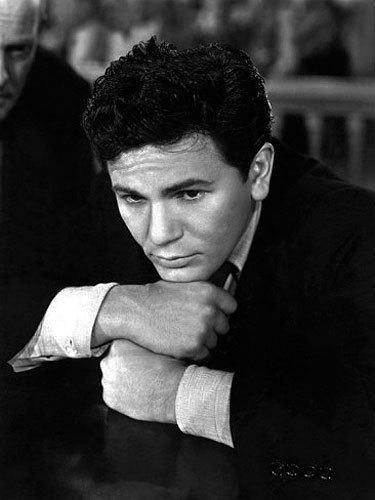
The first episode featured Isaac Butler author of “The Method: How the Twentieth Century Learned to Act.” Butler spoke about Julie and the Hollywood studio system and I’m sure he’ll be on for another episode.

I appreciate how Butler constantly puts Julie’s name out there recognizing his film contributions and how he was the earliest to successfully bring Method acting to Hollywood. Here’s Butler’s recent insightful article about Julie.
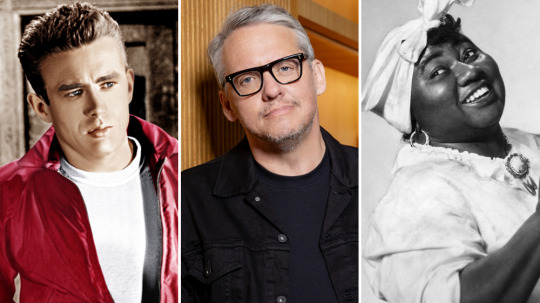
Back to McKay’s podcast which will include bits about Julie. Here’s a content description: “This season, we're getting into 1950s Hollywood, ground zero for a cultural transformation that would upend every aspect of Americans' lives. A movie theater in every city, a TV in every living room, and a Post-war America determined to be happy at any cost. Also during this period….. a slew of untimely Hollywood deaths.
The rules of the road for the next seventy years were being written in real-time, and not everyone would make it out alive. This is the story of how Hollywood sold us on a new American Dream, and left a few unlucky stars holding the bag.”
Read more about the Podcast in VARIETY and INDIE WIRE.
#john garfield#death on the lot#Adam Mackay#Isaac butler#method acting#huac witch hunt#podcast#classic hollywood
6 notes
·
View notes
Photo
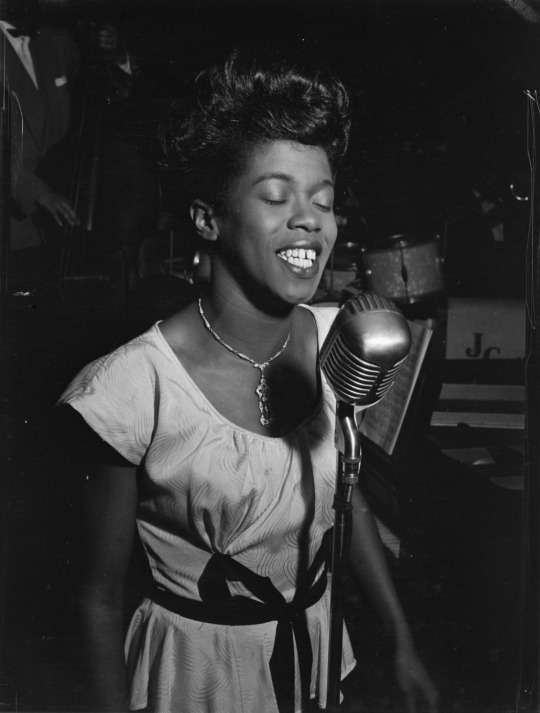
William Gottlieb Sarah Vaughan Performing at Café Society, West Village, New York City 1946
Barney Josephson opened Café Society at Sheridan Square in the West Village in 1938. When he opened the club, a small, basement room, he wanted it to be fully integrated, both on stage and in the audience. In 1938, that was unheard of in the United States, even in as cosmopolitan and sophisticated a city as New York. Josephson had gotten the idea while visiting Paris and seeing the integrated jazz clubs that were flourishing there. He chose the name “Café Society” to mock the snooty Clare Booth Luce, who wrote puff pieces about the habitués of the upscale nightclubs uptown, which she called “cafe society.” Josephson’s slogan for Café Society was “The Wrong Place to the Right People.” He booked many of the great jazz and blues acts of his era, as well as comedians, and he ensured that black customers were as welcome as whites. Among the acts featured at Café Society were Billie Holiday, Lena Horne, Big Joe Turner, Sister Rosetta Tharpe, Josh White, Teddy Wilson, Sonny Terry and Brownie McGhee, Hazel Scott, May Lou Williams, Count Basie, Lester Young, Miles Davis, Charlie Parker, Leadbelly, Big Bill Broonzy and many others. It was at Café Society that Abel Meeropol showed his poem abut the lynching of Black people, “Strange Fruit,” to Josephson, who had him show it to Billie Holiday. It became a part of her set for the rest of her life. Josephson insisted she use the song as the last piece of her set, so people would be left thinking about its powerful lyrics. The club also was a performance place for comedians, most of whom were leftists and did political humor, like Jack Gilford, Zero Mostel, Imogene Coca and a troupe called “The Revuers” that featured Betty Comden, Adolph Green and a young Judy Tuvim, soon to become known as Judy Holliday.
In 1947, the anti-communist witch hunt was in full swing. The progressive politics of Café Society, its integrated scene and the artists who worked there all came to the attention of the House Un-American Activities Committee. Barney Josephson’s brother, Leon, one of the founders of Café Society although not actively involved in running it, was a long time member of the Communist Party as well as being the attorney for his brother and the club, was summonsed to appear before HUAC. He was an unfriendly witness, who refused to name names or to answer questions. He was convicted of Contempt of Congress and spent a year in jail. After his conviction, reactionary columnists like Walter Winchell began attacking Barney Josephson and Café Society as a notorious nest of communists. Customers rapidly fell away and within a year, Barney Jospehson had to close the club.
Most of the artists who performed there remembered there remembered Café Society fondly. John Chilton, author of “Billie’s Blues,” wrote, “Café Society was probably the happiest booking of Billie’s life. It did wonders for her confidence onstage, enabling her to project a more sophisticated act. Barney Josephson encouraged and advised Billie; later he was to do the same thing for Lena Horne.” Horne said Café Society was “the sweetest job I ever got in my life.”
193 notes
·
View notes
Photo
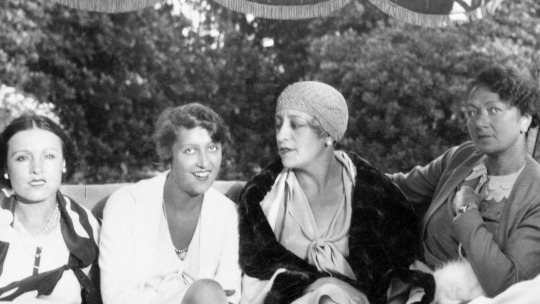
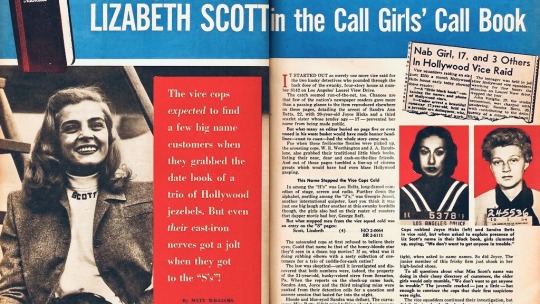
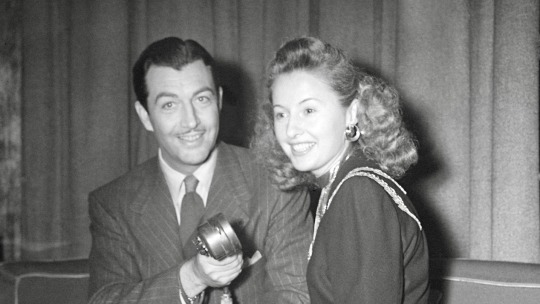
“The atmosphere in the Hollywood lesbian community began to change in the late 1920s and early 1930s. This change was a reflection of three important developments: (1) the increased adoption by the general public of the morbidification of sexual relations between women promoted by some sexologists; (2) the rise of the studio system in Hollywood; and (3) the onset of economic problems connected with the Stock Market Crash of 1929 and the Great Depression. The effect of the heterosexual backlash and the rise of the companionate marriage in the mid- to late 1920s was to push women who loved women further into the closet. The rise of the studio system meant that, were these women ever to venture from that closet and be caught in an embarrassing situation in public, the news media would not print the story. Hard economic times made these women vulnerable to the demands of the studio bosses who protected them—vulnerable enough, for example, to agree to date or even marry a man in order to appear heterosexual when they actually were not. Hollywood had become, in effect, a company town.
Many lesbians and bisexual women in Hollywood in the 1930s and 1940s, especially those from Europe, gathered at the home of Berthold (1885-1953) and Salka Viertel (1889-1978). The Viertels were German émigrés who had come to Hollywood in 1928 to work in the film industry. Like Salka, most of the women who gathered at her home were “Gillette Blades”—that is, their sexuality ‘cut both ways.’ Some American-born actresses also fit into this category of actual or apparent bisexuality, while others were lesbians who adhered to the older model of the Boston marriage and lived with their lovers in what was purportedly a platonic relationship.
Following World War II, and with the rise of the Cold War in the late 1940s, the situation of Hollywood lesbians once again underwent a paradigm shift. After Communists, homosexuals were the favorite targets of witch-hunting politicians and bureaucrats, especially those of the House Un-American Activities (HUAC). At this same time, scandal magazines began to print articles that openly identified homosexual stars as such. The tabloid Confidential was directly responsible for the end of Lizabeth Scott’s (1922-2015) career in motion pictures when it accused her in print of ‘unnatural’ sexual activity. Many of the lesbians and bisexual women who were married began spending more time with their spouses, and many who were unmarried rushed to the alter. Some of the homosexuals in Hollywood reacted to this climate of fear by becoming reactionary in their politics and cooperating with those carrying out the persecutions. Barbara Stanwyck (1907-1990) and her ‘beard’ husband (a spouse who is taken by a women who engages in homosexual behavior primarily to help disguise her lesbian activities) Robert Taylor (1911-1969) became archconservatives after World War II. Taylor, who was also gay, was the only actor to ‘name names’ in front of HUAC. Salka Viertel was blacklisted and left the country. The climate of fear and paranoia among Hollywood homosexuals was to last well into the early 1960s."
-Excerpt from Encyclopedia of Lesbian and Gay Histories and Cultures by Bonnie Zimmerman and George Haggerty
#bisexual#lesbian#homosexuality#sewing circle#queer history#lesbian history#lgbt history#lgbtq#lgbt#lgbt+#lgbtq+#Hollywood#House of Un-American Activities#1920s#1930s#1940s#1950s
342 notes
·
View notes
Text
hm some people talk about "the obsolete man" to the effect of "rod serling predicted the future" which, even as a half-hearted joke, does a great disservice to him and those who he worked with. i have a great many opinions on his life's work (not all of them favorable) but he was quite literally viewing and commenting on the world he had experienced and witnessed. in the episode the chancellor literally says that The State was inspired by hitler and stalin. the twilight zone began airing as the huac started to lose steam in its witch hunting. science fiction, dystopian fiction does not "predict the future", at least not in that way. writers, serling included, may "exaggerate" or allegorize or speculate, but the observations in their work is based off their present time (or the very recent past). perhaps serling "predicted" livestreamed executions in the episode, because he knew that public executions are a means to instill as much fear in as many people as possible (and if thats the goal, would it not make sense to have it broadcast everywhere?). like scifi writers are not modern day oracles, they just observe life and comment on it, as most authors do, it is just sometimes easier to relate to these observations when they have only become more blatant.
86 notes
·
View notes
Text
[CAPE-WATCH HISTORICAL ARCHIVE]: The House Declares War on The Masked Men! HUAC vs the Guardians of the Globe (08/17/1953)
———
This past week, Senator Joseph McCarthy (R-WI), in a televised address to the United States Congress and the House of Representatives, announced that his tireless crusade against the threat of Communist infiltration in American society would be taking on a new dimension: he directed that that a subsection of the House Un-American Activities Committee (HUAC) will turn their efforts towards investigating the many costumed adventurers that reside within the United States, citing that the use of ‘secret identities’ by these masked vigilantes could be a potential mechanism for concealing potential Communist sympathies as well as other forms of deviant behaviour. His first target? The Guardians of the Globe, the group of adventurers often hailed as ‘the world’s greatest superheroes’.
Senator McCarthy’s tirade against suspected Soviet spies and Communist saboteurs is certainly nothing new for the American people. For the past few years, hundreds of stories have flooded the airwaves, with many such as teacher, scientists, actors and even average workers experiencing loss of employment, harassment and even imprisonment over accusations that they harbour affiliations with state agencies and officials in the Soviet Union and Maoist China. In some cases, the mere act of receiving a subpoena from HUAC has resulted in people losing their jobs and their families. Several famous figures such as Albert Einstein, Charlie Chaplin, Burgess Meredith and more have also reported experiencing persecution stemming from HUAC’s scrutiny. Needless to say, public opinion on the investigations has been incredibly divided. Political figures both Democrat and Republican have condemned the actions of McCarthy as unconstitutional and undemocratic, and President Truman himself even attempted to presidentially veto several bills, and upon leaving office earlier this year, claimed that McCarthyism was ‘the corruption of truth, the abandonment of the due process of the law. It is the use of the big lie and the unfounded accusation against any citizen in the name of Americanism or security. It is the rise to power of the demagogue who lives on untruth; it is the spreading of fear and the destruction of faith in every level in society.’
It should come as no surprise, then, that this announcement has drawn much criticism from several parties that favour the costumed adventurers. Many officials in the armed forces, some of whom served alongside these heroes in the not-too-distant fight against the tyrannies of Nazi Germany and Fascist Italy, said that ‘the Senate’s investigations will do far more harm than good to national security, especially when they target the first responders to any American crisis.’ A particular voice among these dissenters is the soldier-turned-superhero Frontline, who mocked the Senator by referring to him as ‘Tail-Gunner Joe’, an apparent reference to McCarthy’s dubious claims of battlefield heroism during the Second World War.
In his announcement, Senator McCarthy outlined two main causes for concern within the Guardians of the Globe that he claims necessitated the investigation: firstly, that the Guardians refused to participate in the recently ended Korean War, citing ‘a new philosophy on superheroics that demands a detachment from geopolitical conflicts’, as well as the membership of the Russian-born superhero Red Rush, who McCarthy stated was their ‘prime suspect in the proliferation of Communist ideals in the superhero community’. Already, several members of the Guardians have denounced this new investigation as nothing short of an authoritarian witch hunt, designed to impede or completely halt their attempts at effecting positive social changes, such as racial equality and equality for women, increased welfare support for the poor and destitute, and an end to the criminalisation of homosexual behaviour. Perhaps the most vocal critic of McCarthy’s new investigation was the Jamaican-born member of the Guardians, Soprano, who gave this rather scathing indictment in her most recent address at the headquarters the National Association for the Advancement of Colored People (NAACP) in Baltimore:
‘This ‘investigation’ by Senator Joseph McCarthy claims to be for the benefit of all Americans, to safeguard the citizens of this nation. But we know better. We, who have bared the brunt of a racist government’s intolerance know the truth of the matter; it is just one more in a long line of attacks against the marginalised, against the Black and the homosexual, against the atheist and the non-Christian, against the left-leaning and the feminist. It is the product of centuries of prejudice and hatred for all of us who do not fit the ideal model of White Christian America. I will not let myself be brought low by such an attack. I will denounce this hateful endeavour at every turn, on both the street and the in the halls of power. The government targets me not for my views or my opinions, but for the colour of my skin and for the empowerment I seek for all Black women. They shall not stop me, nor will they ever stop anyone with the courage to speak out for their people.’
The investigation is purported to be already underway, with multiple investigators probing the personal lives of the Guardians of the Globe for any suspected subversive affiliations, before each member will be called in front of the Permanent Subcommittee on Investigations in the House of Representatives to give their testimony on the collected evidence. After this, the House Judiciary Committee will reach a verdict, and if necessary, hand down a sentence to the appropriate member. Regardless of verdict, some sources speculate that if successful against the Guardians, HUAC will then expand to investigate all heroes residing within the relevant territories of the United States. However, only time will tell how this investigation will turn out, and if it will prove fruitful.
#invincible#invincible show#invincible amazon#invincible oc#🎙️🕊️#brianna clarke#cape-watch#cape-watch historical archive#christina cabello
6 notes
·
View notes
Text

On Oct. 14, 1916, sophomore Paul Robeson was excluded from the Rutgers Football team.
Robeson was one of their best players, but Washington and Lee University refused to play against a Black player. Instead of standing by their full team, Rutgers pulled Robeson from the game.
Robeson went on to be named a football All-American twice, class valedictorian, a lawyer, and one of best 20th century actors, singers, speakers, and advocates for justice.
When summoned by the House Un-American Activities Committee (HUAC) on June 12, 1956, Robeson refused to say whether he was a member of the Communist party and he admonished the committee for running a witch hunt.
I am not being tried for whether I am a Communist. I am being tried for fighting for the rights of my people, who are still second-class citizens in this United States of America.
After the hearing, Robeson’s name was removed from the College Football All-American roster, resulting in the records showing a ten-man team in 1918. Rutgers removed his name from sports records until 1995 when Robeson was inducted posthumously into the Rutgers College Football Hall of Fame. [Zinn]
2 notes
·
View notes